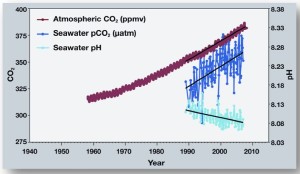By Gavin Roy, MS candidate.

Correlation of carbon dioxide in the atmosphere, seawater, and seawater pH (acidity). Graphic reproduced from Mathaba.
When thinking about climate change, one’s mind often turns to smokestacks, smoggy skies, and the image of mirages on a hot, hazy day. Less considered is what has been called global warming’s “evil twin”: the acidification and warming of the world’s oceans.
In a new research study, marine chemists warn that the present acidification rate of the ocean is well higher than it has been at any time in the last 300 million years. This can be attributed to the ocean absorbing carbon dioxide from the atmosphere. Through this process the ocean has been the most important mitigator of climate change, removing tons of excess carbon from the atmosphere every year.
Like any manmade change to our environment, however, this process is not without consequence. As can be seen in the figure, as atmospheric and seawater carbon dioxide concentrations go up, the average seawater pH continues to decrease, indicating a trend toward increasingly more acidic waters. While a drop in pH of 0.05 may not initially seem like a drastic change, marine scientists assure that this acidification is already affecting delicate marine food webs. One example of this is the 2006-2008 Northwest Oyster Die-off in the US.
Ongoing research into how aquatic life reacts to acidification is similarly not promising. It has been found that in increasingly acidic waters scallop shells corrode, oyster larvae are unable to survive, coral reefs decline, clownfish lose their ability to navigate and sense predators, and the jellyfish population skyrockets.
Estimations from the United Nations indicate that 3 billion people subsidize their diet with fish, and that one billion are directly dependent on fishing as their primary source of food. While ocean acidification may not receive much attention in the global climate change debate, it is obvious that it too needs to be addressed, and addressed soon.
Reference
Mathaba. “Ocean acidity increasing at unprecedented rate.” 28 April 2012, retrieved 6 May 2012. <http://mathaba.net/news/?x=630314>

Comments are closed.